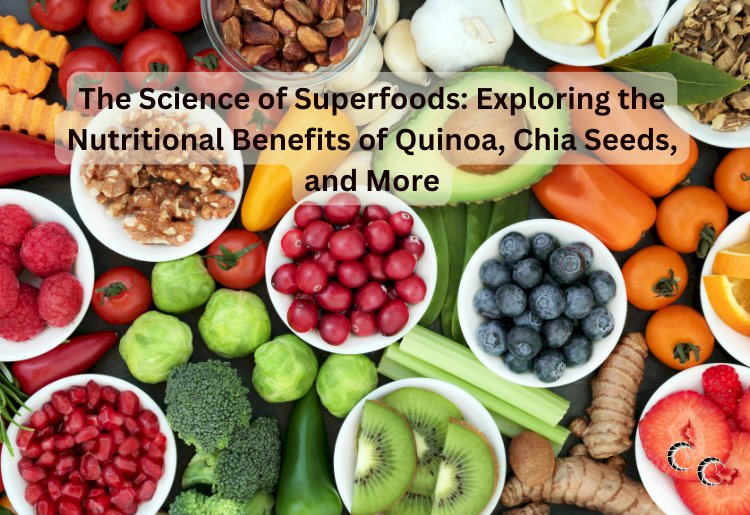The Science of Superfoods: Exploring the Nutritional Benefits of Quinoa, Chia Seeds, and More

In recent years, the term "superfood" has become a buzzword in the world of health and nutrition. Often used to describe foods that are packed with vitamins, minerals, and other essential nutrients, superfoods promise to boost energy, improve overall health, and reduce the risk of chronic diseases. From quinoa to chia seeds, these foods are touted as being powerhouses of nutrition.
But what exactly makes a food "super," and are these foods really as beneficial as they claim to be? In this article, we will explore the science behind some of the most popular superfoods, including quinoa, chia seeds, and others, and take a closer look at the nutritional benefits they offer.
What Are Superfoods?
Superfoods are nutrient-dense foods that provide a high concentration of vitamins, minerals, antioxidants, and other beneficial compounds in a relatively small number of calories. These foods are typically plant-based, though some animal-based foods, such as fatty fish, are also considered superfoods due to their high omega-3 fatty acid content.
While there is no formal scientific definition of "superfood," the term is generally used to refer to foods that have been shown to offer significant health benefits. These foods are rich in nutrients that support various aspects of health, including heart health, brain function, digestion, and immune support.
1. Quinoa: The Complete Protein
Quinoa has quickly become a staple in the health-conscious diet. Often referred to as a "grain," quinoa is technically a pseudo-cereal that comes from a plant related to spinach and beets. What makes quinoa unique is its status as a complete protein, which means it contains all nine essential amino acids that the human body cannot produce on its own.
Nutritional Benefits of Quinoa:
- High in Protein: Quinoa is one of the few plant-based sources of complete protein, making it an excellent choice for vegetarians, vegans, and anyone looking to boost their protein intake.
- Rich in Fiber: Quinoa is an excellent source of dietary fiber, which is important for digestion, blood sugar control, and heart health.
- Packed with Antioxidants: Quinoa contains powerful antioxidants like flavonoids, which help reduce inflammation and protect the body from oxidative stress caused by free radicals.
- Gluten-Free: As a gluten-free food, quinoa is a great option for those with gluten sensitivity or celiac disease.
Research has shown that quinoa can help improve blood sugar control, support healthy digestion, and promote heart health. Because of its versatility, quinoa can be used in a variety of dishes, from salads to soups, and even as a breakfast cereal.
2. Chia Seeds: Tiny Powerhouses of Nutrition
Chia seeds may be small in size, but they pack a serious nutritional punch. These tiny black or white seeds come from the plant Salvia hispanica, native to Central America, and have been consumed for centuries due to their impressive health benefits.
Nutritional Benefits of Chia Seeds:
- High in Omega-3 Fatty Acids: Chia seeds are one of the best plant-based sources of omega-3 fatty acids, which are essential for brain health, reducing inflammation, and supporting heart health.
- Rich in Fiber: Chia seeds are loaded with soluble fiber, which forms a gel-like substance when mixed with water, helping to regulate bowel movements and improve digestive health.
- Packed with Antioxidants: Chia seeds contain antioxidants like polyphenols, which help protect the body from oxidative damage and support the immune system.
- High in Protein and Calcium: Chia seeds are a good source of plant-based protein and contain significant amounts of calcium, which is important for bone health.
Chia seeds have been shown to support heart health by reducing blood pressure and cholesterol levels, as well as promote weight loss by increasing satiety and reducing hunger cravings. With their ability to absorb liquid and form a gel, chia seeds are often used in smoothies, puddings, and baked goods.
3. Berries: Antioxidant-Rich Superfoods
Berries, such as blueberries, strawberries, and raspberries, are commonly referred to as superfoods because of their high levels of antioxidants, vitamins, and fiber. These fruits are known for their ability to protect the body from oxidative stress, support brain health, and promote overall wellness.
Nutritional Benefits of Berries:
- High in Antioxidants: Berries are rich in antioxidants like anthocyanins, which help protect the body’s cells from damage caused by free radicals. This antioxidant content may also help reduce the risk of chronic diseases such as cancer, heart disease, and diabetes.
- Good for Brain Health: Studies have shown that consuming berries regularly can improve memory and cognitive function, thanks to their high levels of flavonoids, which have neuroprotective properties.
- Rich in Vitamin C: Berries are an excellent source of vitamin C, which supports the immune system, skin health, and the production of collagen.
- High in Fiber: Berries are also rich in dietary fiber, which supports digestion, helps control blood sugar levels, and promotes a healthy heart.
Including a variety of berries in your diet is an easy way to boost your intake of vitamins, antioxidants, and fiber, all of which support overall health and well-being.
4. Kale: A Nutrient-Dense Green Leafy Vegetable
Kale is often heralded as one of the most nutrient-dense vegetables, and for good reason. Packed with vitamins, minerals, and antioxidants, kale is a true superfood that can benefit almost every aspect of health.
Nutritional Benefits of Kale:
- High in Vitamins A, C, and K: Kale is an excellent source of vitamins that support eye health (vitamin A), immune function (vitamin C), and bone health (vitamin K).
- Rich in Antioxidants: Kale contains powerful antioxidants like quercetin and kaempferol, which help fight inflammation and protect the body from oxidative stress.
- Good Source of Calcium: As a leafy green, kale provides a plant-based source of calcium, which is essential for bone health and muscle function.
- Supports Heart Health: Kale is rich in fiber and nutrients that support heart health, including potassium, which helps regulate blood pressure.
Kale can be eaten raw in salads, sautéed as a side dish, or added to smoothies and soups. It’s an incredibly versatile superfood that can be enjoyed in a variety of ways.
5. Avocados: Creamy and Nutrient-Dense
Avocados have become a staple in many health-conscious diets due to their creamy texture and impressive nutritional profile. This nutrient-dense fruit is high in healthy fats and contains a variety of vitamins, minerals, and antioxidants.
Nutritional Benefits of Avocados:
- Rich in Healthy Fats: Avocados are high in monounsaturated fats, which are heart-healthy fats that can help reduce cholesterol levels and support overall cardiovascular health.
- Packed with Potassium: Avocados are an excellent source of potassium, which helps maintain proper fluid balance, supports nerve function, and helps regulate blood pressure.
- High in Fiber: Avocados provide a good amount of fiber, which aids in digestion, supports gut health, and helps manage blood sugar levels.
- Rich in Vitamins and Antioxidants: Avocados are rich in vitamins like vitamin E, which acts as a potent antioxidant, and vitamin K, which plays a key role in bone health.
Avocados can be enjoyed in a variety of dishes, from guacamole to smoothies, salads, or simply spread on toast.
Conclusion: The Power of Superfoods
Superfoods like quinoa, chia seeds, berries, kale, and avocados offer a wealth of health benefits, from providing essential nutrients to supporting various bodily functions. These foods are rich in antioxidants, vitamins, and minerals that can help reduce the risk of chronic diseases, support brain and heart health, improve digestion, and promote overall wellness.
Incorporating these nutrient-dense foods into your diet can be a simple yet effective way to boost your health and vitality. While no single food will make or break your health, a balanced diet rich in a variety of superfoods can help you achieve optimal well-being.
Remember, the key to a healthy diet is variety. Enjoying a wide range of nutrient-rich foods, including superfoods, will ensure that you’re getting the essential nutrients your body needs to thrive.






























